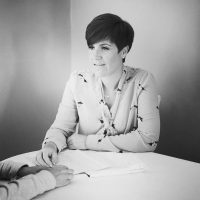View this post on Instagram
Have you ever woken up in the morning with a sense of dread?
With a churning in your stomach, tightening of your chest, and discomfort from the displacement of who you are or who you want to be?
This emotion is felt so often now that we almost expect it. It’s still unnerving, yet knowing to us and our bodies. This sense of fear has been with us for some time and is now just an automatic response: a trigger. This feeling of stickiness has become so normal and patterned in our thinking that we don’t even know what it is we fear anymore.
Maybe we fear the feeling of fear itself?
Fear consumes us and our overview—trying so desperately to shake off the depths to which our emotions feel.
What started as a body’s reaction to danger is now the danger that drags us down—no longer a response, but now desperation.
Which got me to thinking: when does this fear story end?
Because that’s all it is, in its truest sense: a narrative, a story, a report of emotions and feelings and images sited on our beliefs systems and bodies that once wanted to protect us.
We all have our troubles, issues, deep-rooted trauma, and the way we focus our lives.
Up until this realisation, our fears have kept us feeling constricted and anchored to lives we may want to change—they keep us safe.
These fears keep us safe from getting hurt, from failing, from being happy, from not being enough, from being recognised or understood, or from not being our true selves.
We are all on a journey of discovering ourselves—some more consciously than others. With understanding, brings the power to diminish our story as we know it.
Are we prepared for that?
Do we want to accept that?
Our story is all we may have known.
We have made our fear character around it, we have built our expectations of ourselves around it. To break that down can be as liberating as it can be terrifying. When do we allow ourselves to put down the pain and struggle?
Whilst on one hand the beliefs keep us safe, they also isolate us from who we want to become. It’s stopping us from any progression because the narrative is in control. We have become afraid to be happy because the gap between our fear will be too wide and too painful to leave. We know the fear so well that we like the comfort it brings us.
Our thoughts and beliefs become a pattern of routines that we believe help navigate our world. However, all the pattern really does is help us stay anchored to inherited beliefs from our childhood.
We accept our fears—not because they hold us back, but because we know, deeply, that it keeps our trauma safe.
What will it take for us to realise our issues are our own making, our own soap opera, and our own undoing?
Our fear becomes our safety blanket. It becomes our coping mechanism that manifests itself as anxiety, irritable bowel syndrome, nail-biting, obsessive-compulsive tendencies, skin conditions, and so much more.
When becomes the point where we say no more to fear?
When is it time for our story to change?
Do we pass our fear story onto the next generation making them feel as insecure as we are?
So, I ask you to consider this question:
If not now…when?
What do you want your fear story to be? You are the narrator.











Read 2 comments and reply